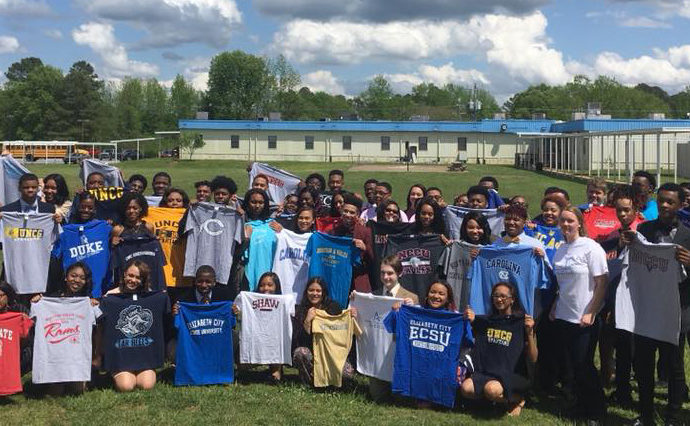The Magic Moment: College Signing Days Make Rock Stars out of College-Bound Seniors, Inspiring Those Waiting in the Wings
ByRichard Whitmire
This is an excerpt from the new Richard Whitmire book The B.A. Breakthrough: How Ending Diploma Disparities Can Change the Face of America. See more excerpts, profiles, commentaries, videos and additional data behind the book at The74Million.org/Breakthrough.
Ajazz band played as 72 graduating seniors from KIPP Gaston College Prep paired off to promenade through the gym before several hundred students, family, and teachers gathered here. No, this is not graduation; graduation is a far lesser event. This is Senior Signing Day for KIPP Gaston’s 10th graduating class. Similar to almost all the big charter networks, senior signing days are “IT” events, proof to everyone that the schools followed through with the promises made to families when they signed up for the admission lotteries: We will get your child accepted into a four-year university.
If you want to know how these charters grew the percentage of their graduates who go on to earn college degrees by a factor ranging from two to five, understanding senior signing day is crucial. Signing days are events that some urban school districts have started copying, which is a good thing. But what gets copied elsewhere, at least from my observations, is a simple mimic that looks more like a party — nothing compared to what happens at places such as KIPP Gaston. What takes place at these charter signing days is more akin to a wedding than a party: It’s a reminder of vows made to get here, and a recommitment of vows to be fulfilled in the future. Signing days are a big reason why the major charter networks post superior college success numbers.
“I am not exaggerating. When the middle school kids watched the seniors, it was like they were watching superstars.”
—Caleb Dolan, co-founder of KIPP Gaston College Prep
The school’s very first signing day, for the Class of 2009, is remembered by co-founder Caleb Dolan as a magical moment. Watching the eyes of the middle school students as the seniors revealed their college choices, Dolan knew that for the first time all students became believers: They truly were part of a college-going culture. “I am not exaggerating. When the middle school kids watched the seniors, it was like they were watching superstars.”
After the event, the middle school students were asked to write how they envisioned their own signing day. It was clear that every student had thought about how that would play out. “It absolutely transformed the way every other student in that campus thought about this process,” Dolan remembers. “It shifted from imaginary to like, ‘Ooh, I can be you know like Adryen. I can be like Katrese.’ And I just can’t overweight that feeling. And its impact.”
What if making it to college was as big as making it to the pros?
Today, senior signing days have become commonplace in many traditional high schools, with former first lady Michelle Obama leading the way with her own go-to-college campaign, which can be followed at #bettermakeroom. But the movement started at Texas-based YES Prep charter schools. In the opening of the book The Power of Moments: Why Certain Experiences Have Extraordinary Impact, authors and brothers Chip and Dan Heath relate an anecdote that best summarizes what their entire book will be about. It starts with YES Prep founder Chris Barbic and YES Prep’s college counselor Donald Kamentz sitting in a now-defunct Houston bar, Ernie’s on Banks — a name chosen by a Chicago guy who loved Cubs star Ernie Banks and opened a bar on Houston’s Banks Street. Here’s what happened next, based on a mix of the book and my interviews with Barbic and Kamentz:
It is a chilly October night in 2000 when Barbic and Kamentz stop by Ernie’s on the way home. They are drinking Shiner Bocks, munching on Tombstone pizza, and watching ESPN. It’s signing day for college athletes, and there’s much shouting, applause, and general backslapping from friends and relatives congratulating these athletes on making it to the big time. “Why shouldn’t our families experience the same acclaim?” they reasoned. Most are the first in their families to go to college, many of them headed to name-brand universities. This needs celebrating, maybe even more than the athletes needed celebrating. “Our kids were going to declare their own colleges, and nobody was going to make a big deal of it,” Kamentz said. “What if we made a big deal of it?”
